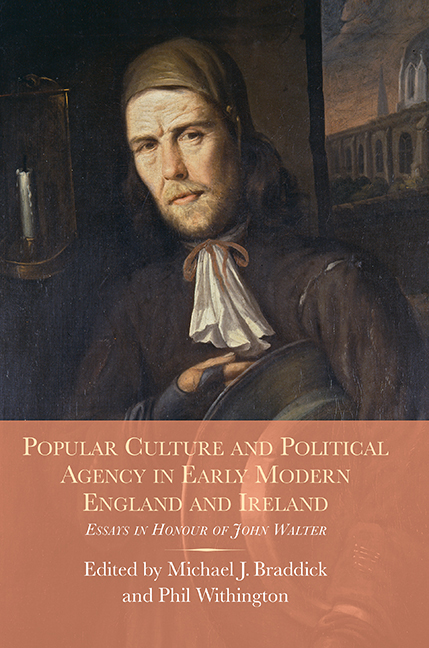 Popular Culture and Political Agency in Early Modern England and Ireland
Popular Culture and Political Agency in Early Modern England and Ireland Book contents
- Frontmatter
- Contents
- List of Illustrations
- List of Contributors
- Acknowledgements
- List of Abbreviations
- Introduction
- 1 John Walter and the social history of early modern England
- 2 Contrasting susceptibility to famine in early fourteenth- and late sixteenth-century England: the significance of late medieval rural social structural and village governmental changes
- 3 The politics of English political economy in the 1620s
- 4 Provision, household management and the moral authority of wives and mothers in early modern England
- 5 Popular senses of past time: dating events in the North Country, 1615–1631
- 6 Spectral lordship, popular memory and the boggart of Towneley Hall
- 7 Self-image and public image in the career of a Jacobean magistrate: Sir John Newdigate in the Court of Star Chamber
- 8 Gender, agency and religious change in early Stuart England
- 9 ‘A Standard which can never fail us’: the Golden Rule and the construction of a public transcript in early modern England
- 10 Religion, anti-popery and corruption
- 11 An ‘Aristotelian moment’: democracy in early modern England
- 12 John Lilburne and political agency in revolutionary England
- 13 An Irish Protestation? Oaths and the Confederation of Kilkenny
- 14 ‘Whereat his wife tooke great greef & died’: dying of sorrow and killing in anger in seventeenth-century Ireland
- Bibliography for John Walter
- Index
- Tabula Gratulatoria
- Miscellaneous Endmatter
11 - An ‘Aristotelian moment’: democracy in early modern England
Published online by Cambridge University Press: 09 May 2017
- Frontmatter
- Contents
- List of Illustrations
- List of Contributors
- Acknowledgements
- List of Abbreviations
- Introduction
- 1 John Walter and the social history of early modern England
- 2 Contrasting susceptibility to famine in early fourteenth- and late sixteenth-century England: the significance of late medieval rural social structural and village governmental changes
- 3 The politics of English political economy in the 1620s
- 4 Provision, household management and the moral authority of wives and mothers in early modern England
- 5 Popular senses of past time: dating events in the North Country, 1615–1631
- 6 Spectral lordship, popular memory and the boggart of Towneley Hall
- 7 Self-image and public image in the career of a Jacobean magistrate: Sir John Newdigate in the Court of Star Chamber
- 8 Gender, agency and religious change in early Stuart England
- 9 ‘A Standard which can never fail us’: the Golden Rule and the construction of a public transcript in early modern England
- 10 Religion, anti-popery and corruption
- 11 An ‘Aristotelian moment’: democracy in early modern England
- 12 John Lilburne and political agency in revolutionary England
- 13 An Irish Protestation? Oaths and the Confederation of Kilkenny
- 14 ‘Whereat his wife tooke great greef & died’: dying of sorrow and killing in anger in seventeenth-century Ireland
- Bibliography for John Walter
- Index
- Tabula Gratulatoria
- Miscellaneous Endmatter
Summary
‘Democracy’ is not a word that appears too often in early modern historiography – not in political histories of the sixteenth and seventeenth centuries; not in histories of political thought, where it perhaps might be expected to crop up; not in social histories of politics, of which John Walter has been such an important and influential exponent. One exception is debates about the democratic credentials, influences, and ambitions of the London Levellers. Others are studies of the trope of mixed government during the 1640s and claims about the democratic potential of the revolutionary ‘public sphere’. But even in works committed to establishing political consciousness and practices outwith the monarchical paradigm, democracy is mainly notable for its absence. Since the revisionism of the 1970s, political historians have preferred to talk in terms of principles rooted in common law and positions based on religious ideology. From this perspective, to talk of ‘democracy’ seems an anachronistic and dangerously ‘Whiggish’ thing to do. Intellectual historians have drawn out the ‘republican’ elements and moments of early modern political thought and traced the conceptual rise of ‘the state’, but they have not discerned an especially ‘democratic’ imaginary or way of thinking; quite the opposite. In the meantime, social historians have observed the increasing participatory extent of local governance, especially from the later sixteenth century, and observed its ‘quasi-republican’ qualities. They have also noted the forms of political agency available to social groups on the wrong side of material inequalities and asymmetries of power: riots, rumour, petitioning, and, in some instances, popular print. In his reconstruction of ‘the Colchester plunderers’, John Walter does both. What he and others have not done, by and large, is regard these politics as ‘democratic’ in any meaningful sense of the term.
The main aim of what follows is to establish just what a historically meaningful sense of democracy might be. It does so not in order to unearth the origins of modern democratic culture or to impose retrospectively modern democratic principles and practices – most obviously universal suffrage – onto early modern actors. On the contrary, the impulse behind the discussion is historicist. The chapter looks to establish whether or not English people living in the sixteenth and early seventeenth centuries knew the term ‘democracy’, in what contexts they did so, and what they meant by it.
- Type
- Chapter
- Information
- Popular Culture and Political Agency in Early Modern England and IrelandEssays in Honour of John Walter, pp. 203 - 222Publisher: Boydell & BrewerPrint publication year: 2017


